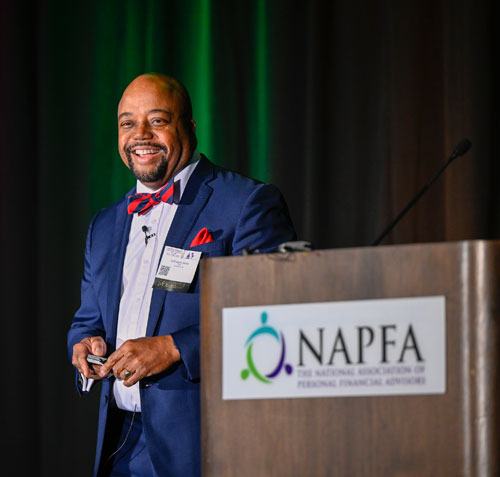NAPFA SPRING CONFERENCE
| Print this Article |

Looking Ahead with Keynote Speakers
By Susan Weiner
Members traveled to San Diego in May for the NAPFA Spring Conference, where keynote speakers David Allison, Crystal Washington, and LaVaughn Henry presented wide-ranging ideas about the many challenges facing advisors now and in the future.
 David Allison: Values Matter
David Allison: Values Matter
Values matter more than demographics or psychographics in helping you understand what motivates clients and prospects, said Allison of the Valuegraphics Project in “The Science of Mass Influence – Break Through Data to Motivate.” To support this, he shared three key findings from his company:
- People with the same demographics are only 10.5% the same.
- People with the same values are eight times more aligned.
- Only 56 values drive everything we do, which means there’s not that much difference between us.
By being attuned to these values, advisors can attract new clients, said Allison. To help advisors, his firm identified three values—relationships, health and well-being, and wealth—highly valued by Fee-Only clients and switchers considering a new advisor. The firm also identified four values—social standing, positive environments, patience, and personal growth—ranked highly by switchers but not current clients.
When advisors focus on these seven values in their communications, they’re discussing things that matter so much to prospects that they “rule everything” in their lives, Allison said. He suggested specific ways advisors can reflect these values in their communications and actions. For example, to cater to those who value relationships, advisors can buy event tickets and let clients invite their friends to the events.
In conclusion, Allison shared three questions that advisors can ask to get a better sense of people’s values:
- Why do you go to work?
- Why would you give away half of your lottery winnings?
- What would you say to your 10-years-ago self and why?
 Crystal Washington: Emphasize Your Humanity to Beat AI
Crystal Washington: Emphasize Your Humanity to Beat AI
“Imagine the Future” was the title and main advice of the presentation by Washington, a futurist. “The future doesn’t just happen. It leaves us Easter eggs,” she said. In other words, advisors can see things now that suggest how the future will develop.
Washington focused on generative artificial intelligence (AI), such as ChatGPT, as one development likely to affect how advisors conduct their business. To avoid being displaced by AI, Washington urged the audience to emphasize the human elements they can bring to a financial planning engagement that AI cannot. When she asked the audience to identify examples of what distinguishes them from robots, people responded with answers such as empathy, compassion, situational awareness, judgment, and handshakes. Advisors should keep this in mind and invest in tech that makes them more human, like creating handwritten notes, Washington said. Coincidentally, Allison’s newsletter in the week after the conference said, “The antidote to #AI is to double down on being human. It’s the one thing AI will never be able to do.”
Washington said that advisors can work on making themselves as close to irreplaceable as possible, but they need to sit with the possibility that they could be replaceable. Also, people are either disrupting or waiting to be disrupted, she said.
 LaVaughn Henry: Inflation Remains Important
LaVaughn Henry: Inflation Remains Important
The Federal Reserve’s fight against inflation took center stage in economist Henry’s keynote. Current inflation has been driven by pandemic-induced supply shocks, consumer demand growth, labor market developments, fiscal policy support, and monetary policy. While inflation seems to have peaked, it remains at high levels not seen in 50 years. When inflation hits, it makes people worry and do irrational things, partly because of the herd mentality, Henry said.
Will skittish consumers bring a recession to the U.S.? The Consumer Confidence Index has rebounded sharply since the pandemic’s start, but it currently points to an elevated risk of recession, Henry said. Consumer spending accounts for 70% of the U.S. economy—and U.S. consumer demand alone is bigger than the gross domestic product of China—so to avoid recession, it’s important to keep consumers buying.
Some positives for consumer spending include consumer delinquency rates at historical lows, consumer debt obligation ratios near historical lows, and strong employment numbers.
However, “All bets are off” if Congress doesn’t raise the debt ceiling. “We’re talking depression,” said Henry.

